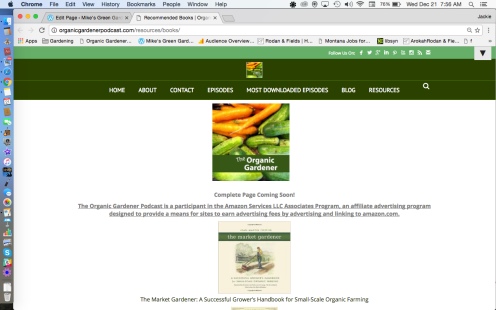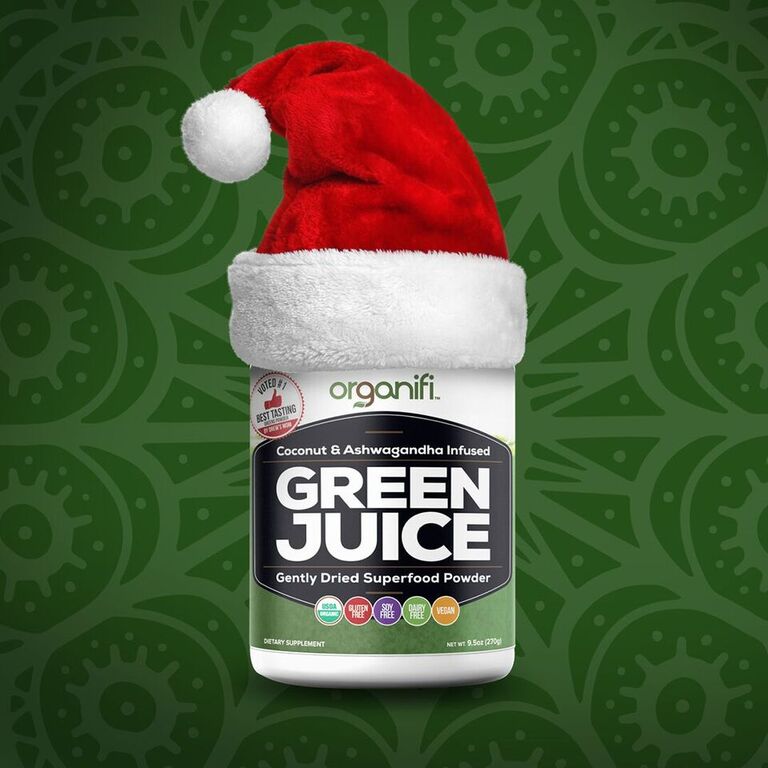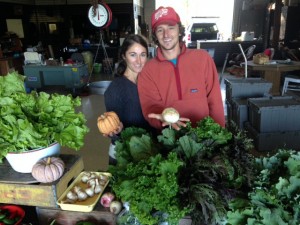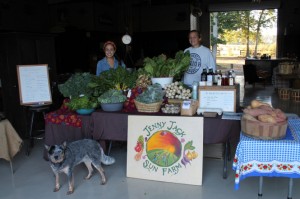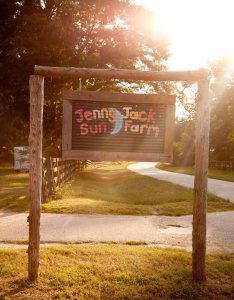Replay of 109. Jenny Jackson | Jenny Jack Sun Farm CSA | Pine Mountain, Georgia
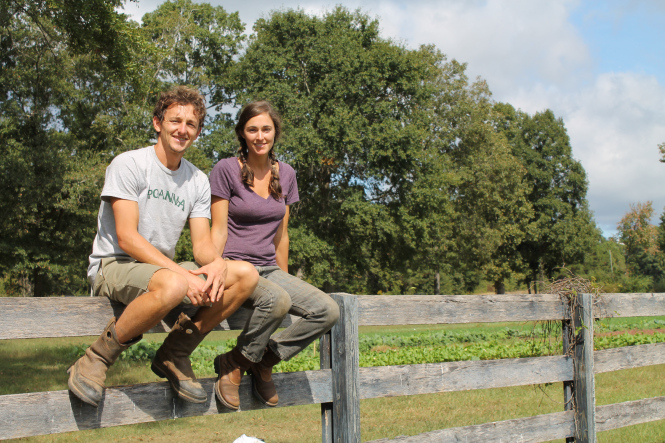
Originally published on 2015/12/31 Christmas Eve! (with a replay the following December 29, 2016) I am replaying this episode because I have a guest coming up who talks about Jenny’s problem of dealing with fire ants. If you haven’t signed up for Jenny’s email I can tell you I love getting their updates it’s always so fun to watch their family grow!
On the Jenny Jack Sun Farm located one‐hour southwest of Atlanta in beautiful Pine Mountain, Georgia, Jenny and Chris Jackson, along with two apprentices, grow a generous variety of fruits, vegetables, herbs, and flowers on 5 acres running a successful CSA. Recently, heritage hogs have been added to the mix, including a rare breed called Red Wattle.
Tell us a little about yourself.
My husband and I have been running the farm full time for 8 years now. We met at the University of Georgia. I studied horticulture and he was an education major. I was interested in the idea of farming in college but I wasn’t really exposed to small diverse farms until after I graduated. I knew I wanted to study plants and how they grow and how to grow them, but I didn’t have a clear path until we traveled after we graduated college. We went to Hawaii to work on different organic farms.
Did you go through the WWOOFer program?
Yes, a friend that had traveled extensively told us about WWOOF. That’s an acronym for Willing Workers on Organic Farms. You can do that pretty much anywhere in the world. We decided we wanted to go to Hawaii, but we knew it was expensive there to go as a tourist. By WWOOFing you can work in exchange for a place to stay and food. By that I mean in a tent.
Tent life as a WWOOFer
But a tent’s probably ok for Hawaii?
Yes, it’s an ideal place to camp for several months, so we stayed there for 5 months working on 3 different farms. We didn’t get an in depth education because as a WWOOFer, you work about 25 hours a week, so that way you have time to explore the area your in. So it was a good introduction. When we came back to Georgia after Hawaii we found a longer term apprenticeship. That’s where we really started learning what we would apply at our farm.
Awesome! I think that’s great advice. I love to hear about experiences like that, I think it’s a good way to learn because One: it’s a lot of work so you can one learn how to be effective and efficient and two: also you can learn if you are ready to do all that work before you make a good commitment. I just had a guest who said you need to learn how to manage one acre effectively before you learn to manage 20. One of my very first guests Todd Ulizio did an apprenticeship and he recommended it because he said you have 0 risk but get all the knowledge.
Tell me about your first gardening experience?
I was fortunate because I grew up in the garden, my parents had a big garden, although I didn’t fully appreciate it as I was younger or help as much as I probably should have, at least I had exposure.
took for granted that you could harvest it and eat it so fresh! Also we had a babysitter who was a serious gardener. When I wasn’t at home with my parents from the time I was a few months old, she had us in her garden just watching her as she tended her plants. So I feel really lucky that I was exposed to it my whole life basically.
What does organic gardening/earth friendly mean to you?
Well basically, there’s so many toxins in our environment today, and a lot of them come from agriculture, so when I started learning about the health hazards of conventional fertilizers, pesticides, herbicides, number 1 I didn’t want to expose myself, or my husband or my workers to that, but when you’re growing for other people you want to make sure it’s as healthy and safe as possible too. For me not only is it about how to care for the soil, but it’s about keeping myself and my husband and our customers as healthy as possible! Personally what I have learned about conventional fertilizers and chemicals I don’t think it’s possible to do it otherwise.
I agree, sometimes I think it’s crazy? How are we eating this stuff?
Who or what inspired you to start using organic techniques?
Not my parents, they were just sort of, not old fashioned, but I guess mainstream gardeners. They used triple 13 or whatever conventional fertilizer people use on gardens. I do think its better to grow your own food, if that’s the only way you are going to do it, I think it’s better then not doing it at all. For them it was just a lack of knowledge about organic growing methods. So I wasn’t exposed organic growing ideas until college, I guess. It’s not something I was taught in horticulture. I was at UGA from 2000-2004. Shortly after I left that they started focusing on more organic gardening methods. So I didn’t learn about it in college but I did get interested in it as I read about the hazards of conventional farming just on my own. It was in Hawaii, when we were working on these organic farms I becomes aware the importance of growing organically.
I just talked with Anna Peach from the Squash and Awe blog in Hawaii!
Tell us about something that grew well on the farm this year.
Growing Organic Tomatoes
Our tomatoes were phenomenal this year! We have just recently put up a couple of hoop houses, that is like a green house except you grow in the ground, it’s basically a high tunnel of plastic over a growing field. This year we had our tomatoes growing in 2 of our hoop houses.
And that made such a difference! By having the plastic over them we could get them in the ground earlier. By avoiding rainfall, we could manipulate the water, just as we need it which is so important especially cherry tomatoes will split in half. And it reduces foliar disease because the rain wasn’t splashing back up on the leaves, the plants were able to stay drier. So less cracking, less disease, longer season! We had a really great tomato crop!
Awesome, those are great tips for listeners.
Georgia Climate
In Georgia, I wouldn’t think that you’d have to worry about a longer season, but you do down there I guess? What’s your climate like?
We have a really great long growing season, but our frost-free date in the spring is April 15th. So in order to get stuff in earlier that’s frost sensitive, all the summer stuff tomatoes, squash, cucumbers, yeah the hoop house is the way to do it. Because we’re growing and marketing and vegetables for a living, the earlier that we can get these things in the better. Because people, our customers are highly anxious to start getting those first summer fruits in late spring.
Did you plant some outside too or just all of your tomatoes are in the hoop house?
This year we did a 3rd planting outside, because our first 2 plantings were inside so our hoop houses were full. We did a 3rd planting in August outside and we harvested those tomatoes up until our first frost around late November.
Is there something you would do different on your farm next year or want to try/new?
Medicinal herbs and plants
Something that I have really gotten interested in this year is medicinal herbs and plants. We have started into that, primarily we grow vegetables, we do have fruit, also chickens for eggs and the hogs. So obviously we’re very diverse, but I really have enjoyed opening another layer of diversification through these medicinal herbs. Our customers have really been interested in it as well. I think as people learn more about the healing powers of plants and herbs. These are the people shopping with us anyway for their fruits and vegetables. They’re very anxious to try these things. So I’m excited about doing more of those things and learning more for next season.
Do you want to tell us any medicinal herbs you planted this year?
Medicinal Herbs
Give us some examples?
Comfrey is one non-edible, that’s probably the first thing I got started with. I had a customer who gave me a plant, she didn’t tell me a whole lot about it, but I attended an herbal class at Georgia Organics Conference, which is our local or state’s non-profit that educates folks on organic methods. I learned about the healing powers of comfrey making a salve with it. I guess I started that as a Christmas gift, the people gave me such great feedback, I decided to make it and sell it, here at our farm market. It sold really quickly, people were telling me that it was helping heal all sorts of skin conditions, with minor skin conditions, like rashes and minor cuts and bruises.
Ginger and turmeric we grew as edibles for culinary use. Then I started looking into the medicinal qualities of both those plants. So we dried a lot for tea, I’ve just started making tincture with those as well.
One of my guests, Patti Armbrister talked about if there were 2 herbs to put in the ground was Comfrey and Borage I think because not only because of the healing, I want to say it’s because they bring in the pollinators.
Yes! The bees love the comfrey flowers, they’re so beautiful, similar to Borage in that they are bell shaped, when it blooms in the spring I notice the bees all over it.
Tell me about something that didn’t work so well on your farm this season.
Well we have a lot of fire ant pressure here, it’s our number one pest each year they actually get worse! There’s only one thing that we’re aware of that you can use organically, its called spinosad. It’s very expensive, I did splurge on some, the ants eat certain seeds like beets, hard to tell with the seed underground, but when things don’t germinate we start looking at the soil and we see a ton of ants, and I have seen ants carrying off some seeds. Not only do they eat the seeds, once they germinate they eat the plants, they just chew at the stems before the plants can get started. What they are doing now is even on the mature plants, they will start feeding at the base of the stem and weaken the plant until it dies. So fire ants are a huge problem for us.
University Study
I would love to participate in some university study for an alternative to see if there are alternatives to the spinosad, because number one it’s expensive, and number two you have to spray the mound or the ants, directly. We have tried the bait granules, whichI didn’t find them to be effective, but they are also expensive so I didn’t find test them any further. So that’s something we always struggle with, but they seem to be worse this year.
So I don’t know if this would help you, but there was a guy, Peter Jordan in Canada I interviewed that’s starting to produce these things called Seed Havens that are a white plastic tray type of thing and they work to get rid of crawling insects. He’s up in Canada, I’m not sure they are availab in the United States yet. I think it might be on a small scale for a home gardener, I don’t know if it would help you on a big scale but someday down the line maybe? They had a problem with crawling insects where he was.
I suppose they bite too.
Yeah and it’s painful.
Is there something that you find is easy to grow and is generally successful every-time.
Yeah, a few things that seem to be relatively carefree for vegetables.
Garlic is one, we always have good luck with garlic. We save our seed each year, which I love being able to do that. We’re not really set up to save a lot of the seed on our farm, because we’re a small farm, so we’re focusing on production so we don’t have enough time to devote to it or isolation distance to keep the seed pure. For garlic you just save the bulbs and plant cloves from those bulbs for the next season. I love being able to save the seeds from the garlic. Because the fire ants don’t eat it, as of yet, deer don’t eat it, no major pests or diseases as of yet.
Sun chokes are one of my favorite crops because they are so carefree. Jerusalem artichokes, is the root of a sunflower. It’s edible, very delicious. It’s a very nutritious crop, because it’s native to this area, I believe it’s native to the whole eastern US. It’s very drought tolerant and just carefree!
They have those pretty little sunflowers.
Yeah! Which is great for bees when not a lot is blooming in late August/September. That’s a really nice time to have some pollen and nectar for the bees.
Something you would steer new gardeners away from that you find is typically challenging to grow in your climate.
We have a big problem with squash vine bores, so for winter squashes we typically just grow varieties of the Machata species, butternut squash, some other examples are Long Island cheese, which is like a round pumpkin, it looks like a pumpkin even though its technically a winter squash. Pennsylvania Dutch which is a crookneck is another type. Seminole. These are all varieties in that Machata species. What happens with those is the stem of the plant gets woody really quickly so they are more resistant to the vine bore. I think, I hear home gardeners say they have trouble with pumpkins, and I think that is one reason, because of the vine bore down here. But also planting early is key for a lot of people here.
I think people think pumpkins fall, so they try to plant mid summer, but the pest pressure is too high, that’s when we have our hottest temps. So if you can plant those things earlier, harvest them late summer they will store until the fall.
Wow! You’re full of great information! Maybe I haven’t had a lot of people from the south so I think a lot of listeners will be excited to hear this episode.
Let’s take a moment to Thank Our Sponsors and Affiliates
Recommended books on the Organic Gardener Podcast
The Organic Gardener Podcast is a participant in the Amazon Services LLC Associates Program, an affiliate advertising program designed to provide a means for sites to earn advertising fees by advertising and linking to amazon.com
Remember you can get an Organic Gardener Podcast discount at organifi.com use promo code OGP16 at checkout for a 15%discount!
organifi.com
use promo code OGP16 at checkout for a 15%discount!
Which activity is your least favorite activity to do on the farm?
I really don’t like dealing with row cover, so that is like a thin sheet to cover them up to protect them, either from frost or pests, I love the benefits that row cover provides, but it’s just something I don’t like dealing with. It’s usually windy on the day we decide to put it out and it’s flapping everywhere and I just really do not like it!
What is your favorite activity to do on the farm?
So many things! I love harvesting especially things that are in the ground, like the sunchokes I was talking about earlier. Sweet potatoes, it’s like digging up a little treasure every time you find one! That’s probably one of my favorite things digging roots in the ground.
We have an on farm market at our farm every Wednesday April through December and I love dealing or interacting with our customers! They come to the farm to pick out their produce and so they can walk around and see the pigs and chickens and all the crops so I really love that aspect of our business too! Just having people on the farm, seeing where their their farmers grow the food! That’s one of the things I love about direct marketing.
Apprentices
Did I see something on your website about helpers? It’s not just you and your husband for 5 acres right?
Yes, right. We take 2 apprentices each season, they’re seasonal, they start typically in February and work through November. This is different from the WOOFing apprenticeship that Chris and I did. With Woofing there’s typically no money exchanged. Usually its more people interested in traveling and it’s a different type of experience that are WWOOFing not necessarily seriously interested in agriculture as a career.
Our apprenticeship is set up with the idea that we are helping to grow farmers. Each year we take on 2 apprentices, not everyone has gone on to farm, maybe 1/2 in our 8 years. It’s a good way to get a full season experience, what it’s like to be on a farm, work on a farm, the lifestyle, so it’s a good way for people to figure out if it’s something they want to pursue. So we have those two people with us and we have volunteers that come, not every week and it’s not something to rely on heavily. But volunteers definitely help us with big projects like planting strawberries and garlic.
Local Employee
Then we have one part time employee who’s local.
That comes back all the time?
Yeah, that’s new for us. We only had one apprentice this year, it just worked out that way, we only hired one person. One of our best customers expressed interest in working part time, she came on in February and it just worked out perfectly. So luckily she’s gonna come back next year. We’re still gonna take on 2 apprentices. I think with increasing the medicinal herbal part it’ll be good to have extra hours she’s gonna help me with that.
So did you say they were gonna get paid then?
They get paid, food from the farm, and housing.
Tell us about the best crop you ever grew.
That happened with the ginger, I have been wanting to grow ginger for a few years, but it’s so hard to get the seed, because it’s in such demand. Most of it that comes from one particular farm, in Hawaii, so I’ve been on the waiting list to get their seed.
So I got the seed this year, planted more because it’s difficult crop to get high yield, but we had lots of fresh baby ginger, much more then our CSA members could use, when we have extra things like that we typically try to sell those chefs in Atalanta and we were able to move it all to these high end chefs in Atalanta.
Ginger Seed
Did you save any of that seed?
It doesn’t make much sense for us to save ginger seed. Because it’s tropical it has to be kept above 60º, we don’t keep a greenhouse warm in winter, so I think for us to provide the right conditions, it would cost us more in energy then to order the seed from the company. Also we retail it from $10-16/lb. It only costs $8/lb even with shipping form Hawaii.
One thing in our show has been a theme lately is saving seed, they grow a little better for your own climate.I’m curious that it has to be kept above 60º, the seeds or the plants? I’m curious why you wouldn’t just keep them in the house.
For ginger seed, you plant the rhizome, which is the part that you eat.
So they’re big?
I’m not sure that you can just keep them, for us or anyone growing ginger, harvest it when it’s baby ginger, so it takes much longer when it’s mature, that has the skin on it. When we harvest it, it has the skin and it’s pretty perishable. I’m not sure how we would keep it over the winter, even if we could keep it we’d probably have to protect it, by keeping it in the soil?
Saving Sweet Potato Seed
We do save our sweet potato seed, which is just a matter of saving sweet potatoes because we can keep those in the house. We can’t keep ginger because it is not cured.
You’re just full of information. I want to say there was girl up here from Buggy Road Farm, Sarah Harding, she I want to say grew turmeric and ginger up here. She had some challenges up hear I think.
It really requires warm temperatures.
A favorite tool that you like to use? If you had to move and could only take one tool with you what would it be.
Probably the scuffle hoe, also known as a stirrup hoe. It is a hoe shaped like a stirrup, it is really effective for weeding when the weeds are small, not something you can take into a field where there’s big clumps of grass or weeds that have a big deep root system. If you are cultivating an area that is just starting to sprout weeds.
What you do is basically sweep it along the surface of the soil, uproots those weed, while your sweeping it across, so there’s no traditional hoe there’s no picking it up and chopping at the ground, so it’s a really fast effective way to get it clean.
Scuffle Hoe
I think it’s one of my husbands biggest successes, because we just don’t get the weeds other people get, is he knocks them out right away, he goes through the soil and makes sure that every bit of crabgrass is gone. I was worried this year especially we put a well in, this year we were going to have a sprinkler, so I was worried because before there was no extra water for weeds, it only went directly on the roots but he didn’t seem to have a big problem after all.
It’s so much more effective if you get them when they are smaller and you’re not yanking those big roots up!
I had another guest Joyce Pinson from Friends Drift Inn Farm in Appalachia in Kentucky and her husband wanted to buy this $125 hoe and she asked the vendor what could possibly be so great about a hoe that it costs that much but she loves it!
Eating or harvesting vegetables or fruit on time?
We do a lot of food preserving. I know if you have a busy schedule and a full time job because I know it’s time consuming to can or freeze, when we have a glut of something, we just make the time to can freeze dry and preserve it for the winter. Because although we have a good selection of greens and roots in our climate that we can harvest in our garden, throughout the winter, it’s nice to have that taste of summer, in jars and freezer. I was surprised with that eggplant really freezes well if you roast it first till it’s soft, then just freeze the pulp, which is really nice for sauces or stews. I haven’t tried like a Baba ghanoush or anything like that with the frozen pulp but it does mix in with tomatoes, for a pasta sauce.
I have to ask, do you peel if first? Or after?
The peel would be too touch frozen. I just make a few slits in a whole eggplant, bake it till it’s really soft, then I scoop that pulp out of the skin. So I do not freeze it with the skin!
I had way too many eggplants this year I couldn’t keep up with. The chickens loved them. I tried to make eggplant parmesan out of all of them but the second batch never got done.
Do you have any special techniques for cooking weird or unusual foods?
When people are unsure about different foods, I usually suggest to roast them. There’s so many vegetables that are delicious roasted, for example: sun chokes. That’s one of my personal favorites but a lot of people seem to be intimidated by it, they haven’t seen it cook it, but they are super delicious just simply roasted with salt and pepper and olive oil, and finish with a little lemon juice. For a lot of root crops you can mix them up, chop them into evenly sliced pieces. I typically do sun chokes, carrots and beets, probably 1/2 inch piece chunks. I don’t peel root vegetables, that come from our farm anyway. I know they don’t have anything that is unhealthy as far as pesticides or herbicides on them. So because they are so fresh, the peeling is very thick. So that’s one step you can skip, I think a lot of people peel out of habit, but it’s really not necessary especially if you are growing your own. Just give it a good scrub under running water and roast them and it really intensifies the flavors and it’s super easy.
I love that too. When I was in college there was a restaurant in our town called Torrey’s Home Cooking that sold food cooked from their farm and they were famous for their mashed potatoes with peels on.
A favorite recipe you like to cook from the garden?
I love to make a gratin with most anything. So that is like a casserole, that is creamy and topped with cheese. You can pretty much use a combination of vegetables to make a delicious gratin. One of my favorites would be to cook down tomatoes, eggplant, zucchini or squash with garlic and onion. Then you pour some cream or milk, top it with fresh grated parmesan or cheddar, any cheese would go with those vegetables pretty much. You can add bread crumbs to the top too, if you want to make it heartier, cauliflower broccoli, any greens you can chop up, wilt down in a pan, garlic olive oil, onion. It’s just a simple filling meal, with a side salad, it’s super fast!
We have a friend who’s a chef, and we have an annual farm dinner, she cooks all of the food from the farm, we usually have about 200 guests, that are seated by the fields. I would love for her to do a cookbook one day with our food.
NEWSLETTER
Do you do a newsletter for you CSA members with recipes in it?
Before we deliver their share, usually the day before I send an harvest list via email so they know what to expect in their box. And in that list I include recipes, especially if it is something unusual they will be getting that week. Also Chris writes a weekly newsletter, it’s a blog, so you can just go to our website and just sign up for it, you don’t have to be a CSA member to receive that. He basically just lets people know what’s going on at the farm that week and includes some pictures.
Tell listeners what the website is.
A favorite internet resource?
ATTRA is a great resource. It’s full of information about sustainable farming, that’s where we find our apprentices, or they find us, because that’s where farms list their apprenticeships from throughout the country and they can search according to state.
That’s where Todd Ulizio from Two Bear Farm said too. That’s where he got his apprenticeship.
A favorite reading material-book, mag, blog/website etc you can recommend?
I really like Growing for Market, now that’s geared towards production farms, lots of good info in that, it’s a magazine that we get, but they have an online version as well.
If you have a business to you have any advice for our listeners about how to sell extra produce or get started in the industry?
We started as a CSA farm, except we partnered with another farm,there were 2 of us (2 farms) providing for a 100 member CSA in Atalanta. So all the pressure wasn’t on us. A CSA is a lot of pressure. We’re very thankful for it because it allows us to actually make a living doing this. The markets we go to farmer’s market to ensure we’re gonna sell everything. For us the CSA is the way to ensure a living. Even though it’s very challenging, it requires us to be very organized, so we partnered with the other farm for the first couple of years, once we were more confident, we went out on our own.
CSA great way for small growers to make a living doing this. I guest what I would suggest not getting too big too quickly. One of the problems with CSAs is that customers just aren’t happy if they aren’t getting the selection or variety that they anticipated. I would suggest start small and build it from there. Often times if you have extra produce, and you have a small CSA you can find other outlets for it, farmers markets and restaurants etc. To retain those members you want to make it good, the best you can possibly give them. I don’t think you by having a big CSA right away.
CSA Business
So when you say small you mean like 10-20 customers right?
It would be different for every situation, how much land you have how much help you have. If it’s a 2 persons growing on an acre or less. I would say less then 25 members would be ideal.
Community Supported Agriculture is where customers buy shares and then they get a basket of vegetables etc each week. So how did that work when you went off on your own, did you have to find your own customers or did some stay with you or how did that work?
CSA Start
We were going up to Atalanta to do the CSA. Atalanta was such an easy market, because there are so many people up there looking for this product. Where we are, 1 hour and 1/2 SW of Atlanta, we just kind of assumed it would be harder to make a living in this area, plus the farm that we apprenticed on was near Atalanta so we had connections up in that area initially.
But then once people in this area heard what we were doing, there was a lot of folks ready to jump in. There were a couple of newspaper articles in the farm in the local papers, and when folks read about it, they just called us right away. We had 30 members before we knew it and it just grew from there. We have had as many as 150 members since we increased the pig operation we’re back down to 100 so we can split our time between the animals and the vegetables.
Do you want to tell us anything about the pig operation, why did you choose pigs, do your CSA members get bacon or something?
Not part of the CSA, just fruits, vegetables and herbs. The pork part is separate, so the CSA customers or any customers can buy pork separately. We got interested in it because #1 we love pork, we had seen other farms who had incorporated pigs into their operation. Pigs for the most part easy to contain in an electric fence, I think that is one of the most limiting factors to raising animals is fencing is so expensive. Pigs are really intelligent and they respect electricity really well.
Electric Fencing
Electric fencing is relative cheap, we just use step-in posts, fiberglass and plastic posts and poly-wire. We connect a charger to that in each paddock, it’s pretty inexpensive. We like the personality of pigs, they’re smart and fun to watch, easy to work… they’re not aggressive. They have a very fast gestation, it’s 3 months, 3 weeks and 3 days. So you can produce quite a few pigs in a short amount of time.
Our farm is set on my parents land and there’s quite a few hardwoods around the edge of our field, we thought that would be a great place to raised pigs because it provides a lot of shade and they could forage on acorns in the fall. So basically looking for a way to utilize more of the land that my parents had available, and we just got interested in pigs and started breeding last year, and now we’re up to about 30.
Sheep Tales
So I laughed because my husband and I get sheep and the other day we took them out some oats and the big ram just butted me in the leg! I thought I’m giving you food and you ram me?!
We thought about sheep and goats. We didn’t really give cows much thought because that requires better fencing and a truck and a trailer to haul them. We have a truck to haul produce, so we gave the animals some thought. For a vegetable operation we were just too concerned that the sheep or goats would get out and eat things.
One of my guests, Don Tipping, from Seven Seeds Farm and Siskiyou Seeds, the other day who said similar things about not wanting the sheep to get into their kale.
We too were nervous about grazing animals and destroying the vegetable field, they do like vegetables but we throw them scraps and things, have big areas to graze, both grass and wooded lots so they stay pretty happy in their fenced area.
Final question
If there was one change you would like to see to create a greener world what would it be? For example is there a charity or organization your passionate about or a project you would like to see put into action. What do you feel is the most crucial issue facing our planet in regards to the environment either in your local area or on a national or global scale?
That’s a big one! food waste is a big concern of mine, when I found out that Americans typically throw away half the food, fresh food that we purchase. That really turns my stomach, especially the thought of folks purchasing our food that we’ve worked so hard for, and then just letting it waste. There’s a lot of hunger out there, a lot of need for food, and we can figure out how to reduce waste and how to get the food that’s available into the hands of the people that need it, I think that would be huge!
Do you have an inspiration tip or quote to help motivate our listeners to reach into that dirt and start their own garden?
I would say, if you can make food a priority in your life, I know that is difficult with people’s busy schedule. It’s hard working a full time job, and being away from home all day, that finding the energy and enthusiasm to go out and work in the garden, but I think making food a priority is so important for their health, for their emotional well being,. It’s important to teach other people, so if you have kids to expose them to raising food. I would encourage people and I hope that people would be inspired to make food and growing food a priority in their lives because I think it is so important for their overall.
You’ve been such a great guest! I think you are just my perfect avatar, and I might save this for New Years. Giving us valuable tips and knowledge. I’ve had a few guests talk about how they don’t even know that potatoes or carrots grow in the ground, and there’s this big disconnect in our world now. But fortunately there’s a strong farm-to-school movement going on. I was going to ask, did you come from a big family?
There’s just me and my sister.
I like to encourage listeners to share with their kids and grandkids because so many of my guests take about learning with their families. And even if there’s a little resistance you might find that
How do we connect with you?
Recommended books on the Organic Gardener Podcast
The Organic Gardener Podcast is a participant in the Amazon Services LLC Associates Program, an affiliate advertising program designed to provide a means for sites to earn advertising fees by advertising and linking to amazon.com
Remember you can get an Organic Gardener Podcast discount at organifi.com use promo code OGP16 at checkout for a 15%discount!
organifi.com
use promo code OGP16 at checkout for a 15%discount!
If you like what you heard on the Organic Gardener Podcast we’d love it if you’d give us review and hopefully a 5 star rating on iTunes so other gardeners can find us and listen to. Just click on the link here.
We’d love if you’d join Organic Gardener Podcast Facebook Community!
To learn about the iTunes giveaway visit our website at the organicgardenerpodcast.com

